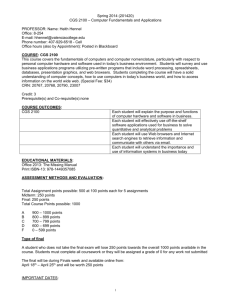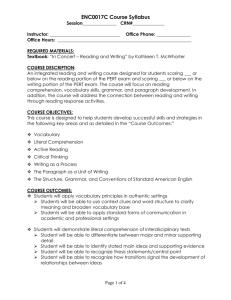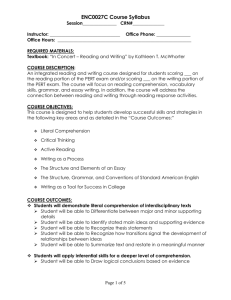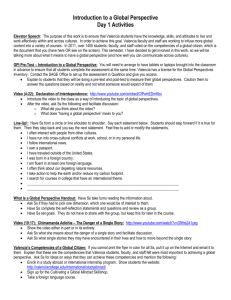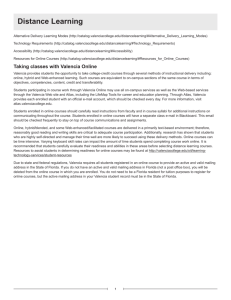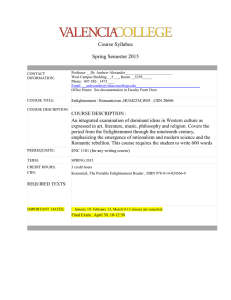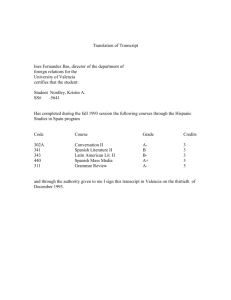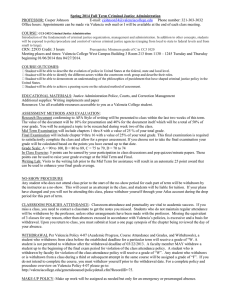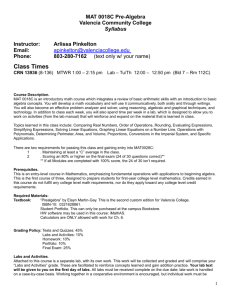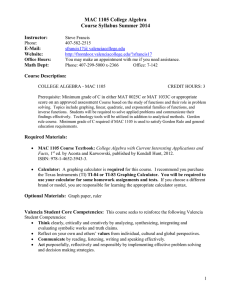Introduction to Humanities
advertisement
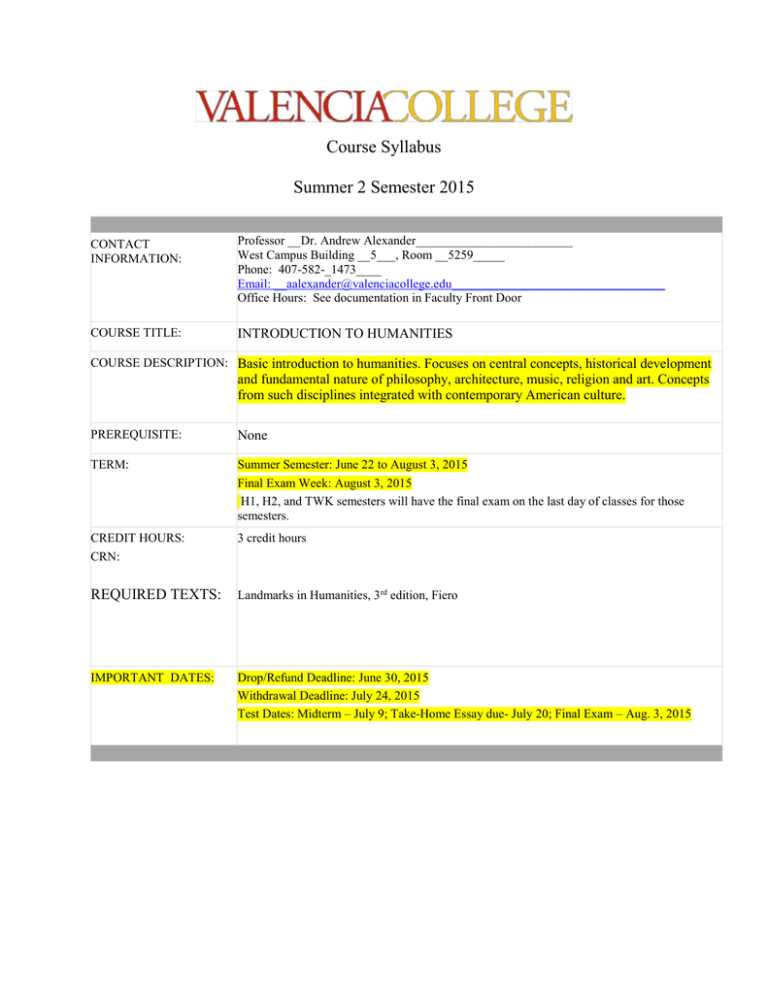
Course Syllabus Summer 2 Semester 2015 CONTACT INFORMATION: Professor __Dr. Andrew Alexander_________________________ West Campus Building __5___, Room __5259_____ Phone: 407-582-_1473____ Email: __aalexander@valenciacollege.edu__________________________________ Office Hours: See documentation in Faculty Front Door COURSE TITLE: INTRODUCTION TO HUMANITIES COURSE DESCRIPTION: Basic introduction to humanities. Focuses on central concepts, historical development and fundamental nature of philosophy, architecture, music, religion and art. Concepts from such disciplines integrated with contemporary American culture. PREREQUISITE: None TERM: Summer Semester: June 22 to August 3, 2015 Final Exam Week: August 3, 2015 H1, H2, and TWK semesters will have the final exam on the last day of classes for those semesters. CREDIT HOURS: CRN: 3 credit hours REQUIRED TEXTS: Landmarks in Humanities, 3rd edition, Fiero IMPORTANT DATES: Drop/Refund Deadline: June 30, 2015 Withdrawal Deadline: July 24, 2015 Test Dates: Midterm – July 9; Take-Home Essay due- July 20; Final Exam – Aug. 3, 2015 COURSE FORMAT & METHOD OF INSTRUCTION The course will be taught through a combination of lecture, group discussions and homework assignments. Students should not assume that there will be class time to complete homework assignments. Required readings, assignments and other activities will be provided. Summer Semester B begins June 22, 2015 Electronic Devices in class Cellular phones cannot be on your desk at any time. Text messaging or answering your cell phone while in-class will be considered disruptive behavior and can be a cause for your dismissal from class. NO ELECTRONIC DEVICES AND NO TEXT MESSAGING. At no time will you be allowed to listen to your IPOD or MP3 player in class. You are not allowed to have any music device on your desk. Also, notebooks (computers) are not to be used during class. It is distracting to other students. MAJOR LEARNING OUTCOMES. Students will demonstrate an understanding of the key philosophical theories concerning the nature of reality, knowledge and society. Students will display an understanding of the major values in the world’s religions. Students will show an understanding of diverse movements in the arts. Students will demonstrate an understanding of the various styles in music. Students will examine various perspectives on the nature of human creativity. INSTRUCTIONAL MATERIALS: Textbook, Handouts, Films and Videos. GRADING SCALE: The following grading scale is used: A=90-100; B=80-89; C=70-79; D=60-69; F=below 60 Each test will count for 30%. Attendance and class participation will count for 10% of the final grade. COURSE ASSIGNMENTS & GRADING: Participate and contribute to all learning activities - Actively participate in all work, learning and discussions (including completing readings prior to discussions) related to learning activities. Be a positive student and teammate –- Conduct yourself in a professional and scholarly way that will enable peers and faculty to perceive you as a positive role model. ATTENDANCE POLICY & If you must miss a class or activity or are late it will impact your grade. Classroom and NO SHOW PROCEDURES: activity attendance and punctuality is vital to academic success. Excused absences will be allowed in accordance with Valencia’s official policies. You must attend class all semester, be on time and submit the assignments on the due dates to meet the attendance requirement. For example: ATTENDANCE: # Absences 0 1 2 3 grade A B C D etc. WITHDRAWAL POLICY: Per Valencia Policy 4-07 (Academic Progress, Course Attendance and Grades, and Withdrawals), a student who withdraws from class before the established deadline for a particular term will receive a grade of “W”. A student may withdraw at any time during the term in Atlas. The New Withdrawal Policy has been implemented. Here’s what you need to know about the new Withdrawal Policy: · · · · · Students may withdraw themselves for a W up until the withdrawal deadline. After the withdrawal deadline each semester, students can no longer withdraw themselves. WP and WF have been deleted from Withdrawal procedures. Before the withdrawal deadline, both a student and faculty may withdraw the student. After the withdrawal deadline, a student cannot withdraw him-/herself. Excessive absences/ Lateness of fifteen minutes or early departure will count as a missed hour. A professor can withdraw you from a course for excessive absences without your permission. (2002-03 College Catalog p.62) Do not leave early without informing me. This is disruptive and rude. Student behavior or speech that disrupts the instructional setting or is clearly disrespectful of the instructor or fellow students will not be tolerated. Disruptive conduct may include but is not limited: . Rude or disrespectful behavior; . Unwarranted interruptions; . Failure to adhere to instructor’s directions; . Vulgar or obscene language, slurs, or other forms of intimidation; . Physically or verbally abusive behavior. Student’s behavior that is inappropriate will result in disenrollment from the course. Any student knowing he/she is not passing the course but fails to withdraw by July 24, 2015 and decides to stop coming to class should know the professor will not withdraw him/her from the course, and the grade of F will be assigned. MAKE-UP POLICY: Exams and Final Exam cannot be made up. NO LATE ASSIGNMENTS WILL BE ACCEPTED. Only documented special situations will count as exceptions to these rules. CLASS PARTICIPATION: Participation in class involves a number of variables, including but not limited to: • Your willingness to participate actively in all class activities. • Your cooperation during group and pair work. • Your respect and attitude toward the class and your peers. • Your daily preparation for each class. • Your instructor may assign written homework that will be collected and graded; these assignments form part of your participation grade Participation does not mean interrupting the class, leaving the room and coming back, and/or just asking questions. CLASS PARTICIPATION: A (90-100) B (89-80) C (79-70) D (69-60) F (59-0) Student prepares for the lesson, volunteers answers, responds correctly. Student responds when called upon; answers are generally correct. Student has some problems with the subject, but makes an effort to be prepared, understand, and respond. Student does not respond correctly, is not prepared for class, does not have materials ready, and is absent frequently. Student can’t answer questions, does other things not concerning class, and is absent most of the time. ACADEMIC HONESTY: Each student is required to follow Valencia policy regarding academic honesty. All work submitted by students is expected to be the result of the student’s individual thoughts, research, and self-expression unless the assignment specifically states “group project.” Any act of academic dishonesty will be handled in accordance with Valencia policy as set forth in the Student Handbook and Catalog. Plagiarism will not be tolerated and will result in a failing grade for the assignment. Student Conduct and Academic Honesty: VCC Expected student conduct: 10-03 Student Code of Conduct Specific Authority: 1006.60, FS. Law Implemented: 1006.60, FS. Valencia College is dedicated to the advancement of knowledge and learning, and to the development of responsible personal and social conduct. By enrolling at Valencia, a student assumes the responsibility for knowing and abiding by the rules of appropriate behavior as articulated in the Student Code of Conduct. The primary responsibility for managing the classroom environment rests with the faculty. Faculty may direct students who engage in inappropriate behavior that results in disruption of a class to leave the class. Such students may be subject to other disciplinary action, which may include a warning, withdrawal from class, probation, suspension, or expulsion from the college. Please read the Student Code of Conduct in the current Valencia Student Handbook. Here is the link to Valencia’s Student Code of Conduct website: http://www.valenciacollege.edu/policies/policydetail2.cfm?PolicyCatID=10&Po licyID=3 Exams and homework are considered individual effort; any submissions that are too similar for coincidence will receive no credit. Students may collaborate in group-assignments. Collaboration should be used to edit or to clarify doubts. If anyone is involved in incidents of cheating a zero will be given. Each student is expected to be in complete compliance with the college policy on Academic Honesty as set forth in the admissions catalog and the student handbook. Any student(s) cheating on an exam will receive a zero on the exam. This cannot be replaced with the final score and the professor at his/her discretion can withdraw you from the class. Students are responsible for preparing for class by reading pre-assigned readings and completing assignments. Students who are absent are fully responsible for all material covered in class. Leaving a message on my phone or sending an e-mail will not be an excused absence. Make sure you can contact your classmates too. Students should bring the textbook and any other material required for class. During exams and quizzes, students may not leave the room. The instructor’s office extension is ___1473__. Messages should consist of your name, your class and class time, and a brief message. Questions such as “What did we cover in class?” will not result in a response. Due to the problem of “phone tag”, student phone calls will normally not be returned. Emails with specific questions will be answered as soon as possible, usually within 24 hours (during week days). Students who need more than a brief response should arrange a meeting with the instructor. Wandering in and out of the classroom without prior permission is unacceptable and you could lose participation points for doing so. Doing such things will affect your grade. Also, improper conduct like interrupting too much, talking with peers, being disrespectful to professor and peers will affect your grade. Joking and having small conversations while the professor or peers are talking are considered disruptive behavior and will not be tolerated. Cellular phones cannot be on your desk at any time. Text messaging or answering your cell phone while in-class will be considered disruptive behavior and can be a cause for your dismissal from class. NO ELECTRONIC DEVICES AND NO TEXT MESSAGING. At no time will you be allowed to listen to your IPOD or MP3 player in class. You are not allowed to have any music device on your desk. Also, notebooks (computers) are not to be used during class. It is distracting to other students. The use of the computers is exclusively for activities relevant to the class. Activities not in accordance with the Valencia Student Code of Conduct will be considered a violation. INTERNET RESEARCH Because of the variety of sources, ease of publication, lack of central control and proliferation of commercial information on the free Internet, it is often hard to tell if the information is reliable. Many sites contain research and information of high quality. However, unlike traditional print publications or library-based electronic resources, there is usually no process of peer review, nor is there an editor verifying the accuracy of information presented on the Internet. There are an increasing number of sites containing information that may be incomplete, anonymously written, out-of-date, biased, fraudulent, or whose content may not be factual. Students should, therefore, use caution in use of the Internet for their research needs when working on activities. For academic topics that are addressed in scholarly literature, uses of electronic databases or visiting the library may better meet your needs. However, each professor makes the final determination of what is or is not accepted as a valid source so review the syllabus for specific guidelines from your professor. Office of Students with Disabilities: Students who qualify for academic accommodations must provide a letter from the Office for Students with Disabilities (OSD) and discuss specific needs with the professor, preferably during the first week of class. The Office for Students with Disabilities (West-SSB 102) determines accommodations based on appropriate documentation of disabilities. The goal at the OSD is to open doors, remove barriers and assist you in any way they can. The key to success is matching your needs to the services provided. Please contact this office to discuss your individual needs. The link to Valencia’s OSD website: http://www.valenciacollege.edu/osd TESTING CENTERWEST The TESTING CENTER-WEST is located in Building 11 Room 142 --407582-1323 Please note!!! No tests are given out the last hour before closing—for example, if the Center closes at 9 p.m., the last test is given out at 8 p.m. Tests will be collected 5 minutes prior to closing. Fall and Spring Terms: Monday through Thursday 8:00 a.m. – 9 p.m. Friday 8:00 a.m. – 5 p.m. Saturday 9 a.m. – 2 p.m. Summer Full Term, Session A, and Session B Regular Hours except for Fridays: Fridays: 8:00 am- 12:00 Noon WHAT YOU NEED TO BRING Your Valencia Photo I.D. is REQUIRED for all tests! Valencia Photo IDs are taken in the Student Development offices on each campus (West Campus office is on the 1st floor of Building 3). The Valencia photo I.D. also has your VID number on it. The name of the course you are taking and your instructor’s name. All supplies you will need to take the test. If your test requires bluebooks or green scantron sheets, purchase them in the bookstore. The Testing Center does not provide notebook paper, pens or pencils. Dictionaries and calculators may be borrowed. WHAT YOU DO NOT BRING 1. Beepers, cell phones, personal tape or CD players, palm pilots, laptop computers. 2. Food or beverages. You will not be allowed to take these to your seat. 3. Children are not permitted in the Testing Center – The Testing Center does not provide sitting services during your test. Valencia General Education Student Learning Outcomes CULTURAL & HISTORICAL UNDERSTANDING: Demonstrate understanding of the diverse traditions of the world, and an individual's place in it. ETHICAL RESPONSIBILITY: Demonstrate awareness of personal responsibility in one's civic, social, and academic life. CRITICAL THINKING: Effectively analyze, evaluate, synthesize, and apply information and ideas from diverse sources and disciplines. IMPORTANT VALENCIA WEBSITE LINKS: College Calendar: http://valenciacollege.edu/calendar/ College Catalog: http://valenciacollege.edu/catalog/ Valencia Policy and Procedures: http://valenciacollege.edu/generalcounsel/policy/ FERPA: http://valenciacollege.edu/ferpa/ ADA: http://valenciacollege.edu/osd/handbook/sec4.htm Medical Records: http://valenciacollege.edu/generalcounsel/policy/ValenciaCollegePolicy.cfm?poli cyID=186 DISCLAIMER: Changes may be made at the discretion of the instructor. REVIEW SESSIONS: Small groups are used to review the course materials before each unit test is given. Each group will get a proposition to defend at the end of each unit. Adequate discussion time will be given every day to reflect on the general topics as well as the specific debatable propositions in the unit. At the end of the course, the winning group will be announced. PROPOSITIONS FOR DEBATE: UNIT 1- PHILOSOPHY 1. Idealism is a better theory of reality than naturalism. 2. Naturalism is a better theory of reality than idealism. 3. Empiricism is a better theory of knowledge than rationalism. 4. Rationalism is a better theory of knowledge than empiricism. 5. Capitalism is a better ideology than Marxism. 6. Marxism is a better ideology than capitalism. UNIT 2- RELIGIONS 1. The ultimate values in the world’s religions are basically similar. 2. The ultimate values in the world’s religions are basically different. 3. The value systems in the world’s religions contain major similarities and differences. UNIT 3- ART & MUSIC 1. Neoclassical art is better than romantic art (or vice versa). 2. Cubism is better than surrealism (or vice versa). 3. Pop art is better than abstract expressionism (or vice versa). 4. Classical music is better than romantic music (or vice versa). 5. Serial music is better than spatial music or jazz (or vice versa). 6. Stravinsky’s concept of creativity is better than Varese’s concept of creativity (or vice versa). COURSE OUTLINE Sessions Dates Topics Pages 1. 6/22 INTRODUCTION Syllabus 2. 6/23 Plato & Aristotle 41-47 3. 6/24 Plotinus, Augustine, Aquinas 101, 152-3 4. 6/25 The Scientific Revolution 293-5 5. 6/29 The Scientific Revolution 295-6 6. 6/30 Bacon 295-6 7. 7/1 Descartes 296-7 8. 7/2 Newton 297 9. 7/6 Smith 302 10. 7/7 Marx 358-9 11. 7/8 Review Philosophy 12. 7/9 Test #1 in Class (Essay #1) 13. 7/13 Hinduism & Buddhism 22-3, 117-9 14. 7/14 Daoism & Confucianism 26, 43 15. 7/15 Judaism & Christianity 91-100 16. 7/16 Islam & Review Religions; Take-Home (Essay #2) 109-116 17. 7/20 Essay #2 Due; Neoclassical & Romantic Art 316, 342-5 18. 7/21 Neoclassical & Romantic Art 316, 342-5 19. 7/22 Cubism & Surrealism 394-7, 404-5 20. 7/23 Abstract Expressionism & Pop Art 421-2, 436 21. 7/27 Classical & Romantic Music 22. 7/28 Stravinsky vs. Varese on Creativity 318-22, 34752 411 23. 7/29 Serial Music, Spatial Music, Jazz 411-2 24. 7/30 Review Art & Music 25. 8/3 Final Test in Class (Essay #3)
